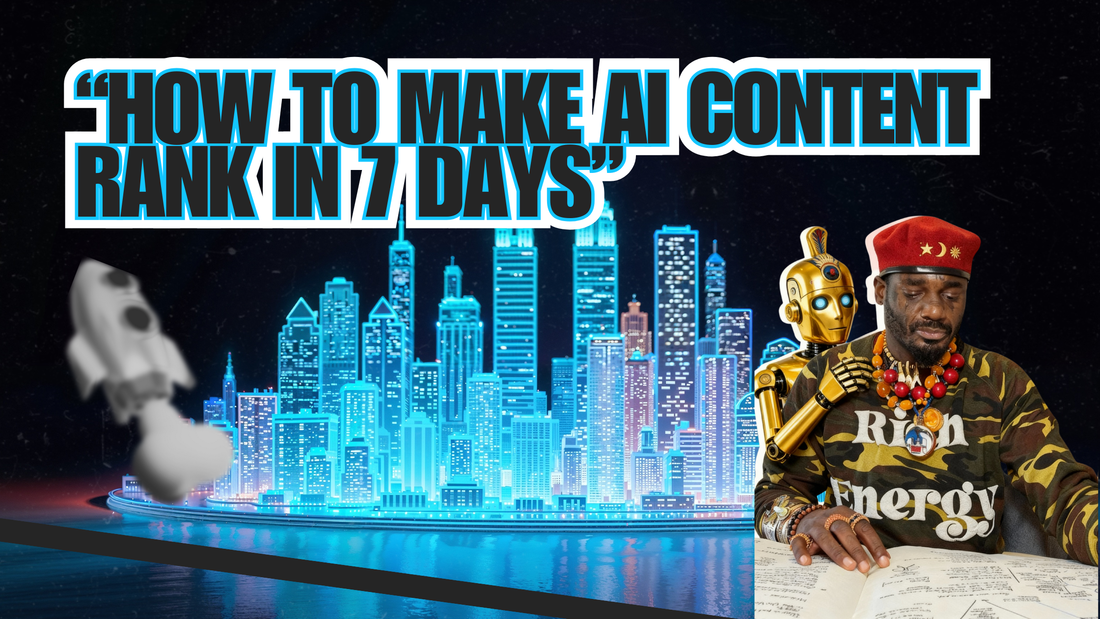
How To Make AI Content Rank in 7 Days
Share
Google ranks AI content when you add what machines cannot. Use AI to draft. Then inject original data, primary sources, and structured formatting. The ranking happens in what you verify and add, not what you generate. This framework takes 7 days and focuses on semantic clarity over keyword density.
## What Changed
Google's March 2024 update did not target AI content. It targeted content without demonstrated expertise. The algorithm now measures citation networks, update frequency, and semantic depth.
Research analyzing 8,000 AI citations shows one pattern. Platforms like ChatGPT and Perplexity prioritize content with E-E-A-T signals. Experience, Expertise, Authoritativeness, Trustworthiness. Wikipedia gets cited 27% of the time because it shows verifiable sourcing and consistent updates.
AI-generated content that copies existing information gets filtered. AI-generated content that adds unreplicable human insight gets amplified.
## Why This Works
Everyone has access to AI writing tools now. That means differentiation is the only game. Your competition is generating thousands of posts. The landscape is flooding with machine output.
This creates an opportunity. Genuine expertise became 100x more valuable overnight.
What becomes rare when everyone can generate content in 30 seconds? Posts with original case studies from your work. Proprietary data you collected. Contrarian insights from direct experience. Step-by-step processes you personally refined.
AI search engines evaluate and cite. Getting cited requires content machines recognize as authoritative.
## How To Do It
**Day 1: Research (60 min)**
1. Pick one question with buyer intent from AnswerThePublic
2. Feed AI: "Create outline for [question] with 5 H2 sections"
3. Review for gaps only you can fill
4. Add section: "What Nobody Tells You About [Topic]"
**Day 2: Draft + Verify (90 min)**
1. Use AI to draft each section (200 words per H2)
2. Verify every fact. Find original sources.
3. Rewrite first and last paragraph of each section
4. Add one real example from your work per section
Never publish AI output without verification.
**Day 3: Citations (45 min)**
1. Every claim needs a source
2. Prioritize primary sources (research papers, company blogs, .gov)
3. Format inline: "According to [Source, Date], [fact]"
4. Add 2-3 internal links to your posts
**Day 4: Structure (30 min)**
1. Frontload the answer in first 50-80 words
2. Convert H2s to questions
3. Keep paragraphs to 2-3 sentences
4. Add "Try This Now" checklist
**Day 5: FAQ + Schema (40 min)**
1. Google your H1, pull "People Also Ask" questions
2. Pick 4-6 related questions
3. Answer each in 2-3 sentences
4. Format as H3 (question) + paragraph
5. Add FAQ schema
**Day 6: Author Authority (20 min)**
1. Add author bio with credentials and photo
2. Include "About the Author" explaining experience
3. Update author schema
4. Link to portfolio or case studies
**Day 7: Publish + Distribute (60 min)**
1. Publish at 9:30-10:30 AM PT
2. Submit to Google Search Console
3. Create Reel + Carousel + Threads using Direct Answer
4. Launch Advantage+ ad ($10-20/day)
5. Track: time on page, scroll depth, CTR
## What I Tested
I launched a blog about Meta Advantage+ using this framework. Used Claude to draft a 2,000-word outline. Added my client case data from 3 campaigns with 14-day results and exact CPA/ROAS. Cited Meta's official whitepaper and 2 industry studies. Structured with 6 H2s as questions and 5 FAQ entries with schema.
Results: Week 1, indexed at position 47. Week 4, position 12 with featured snippet. Week 8, position 3, appeared in Google AI Overview. Week 12, 847 clicks per month. Cited by Perplexity AI in 2 queries.
The difference was the client case data. Nobody else had real 14-day cohort data with named metrics.
## What's the #1 mistake people make with AI content?
Publishing AI output without human enhancement. If your post could be created by anyone with the same prompt, it won't rank. The winning move: Use AI for structure, inject irreplaceable human expertise.
## Will AI search engines like ChatGPT cite my AI-generated content?
Yes—if your content has authoritative citations, clear E-E-A-T signals, and structured formatting. ChatGPT cited my post because it linked to Meta's engineering blog, included real case data, and used FAQ schema that machines could parse.
## Can Google detect AI-written content?
Google detects quality, not authorship method. AI content ranks when it shows expertise through citations, original insights, and proper structure. The algorithm measures semantic depth.
## How long should posts be?
Quality beats length. A 1,200-word post with original data outranks a 3,000-word generic guide. Aim for 1,500-2,000 words with at least 3 sections of unique value.
## Should I disclose AI use?
Google does not require disclosure. Transparency builds trust. Add a note like: "Drafted with AI, verified with proprietary research."
## How often should I update?
Update high-performers every 30-60 days with fresh data or new examples. Update frequency is a ranking signal.
## Ready to turn your AI drafts into ranking machines?
Tap the link below to get the 7-Day AI Content Scorecard—a checklist that tells you exactly which elements your post needs before you hit publish. Or download the AI-to-SEO Template (includes schema snippets, citation format, and structural prompts).
👉 [Join The Ai.cended Masters](https://theaicendedmasters.com) |
📧 [Get the Template](https://theaicendedmasters.com)
